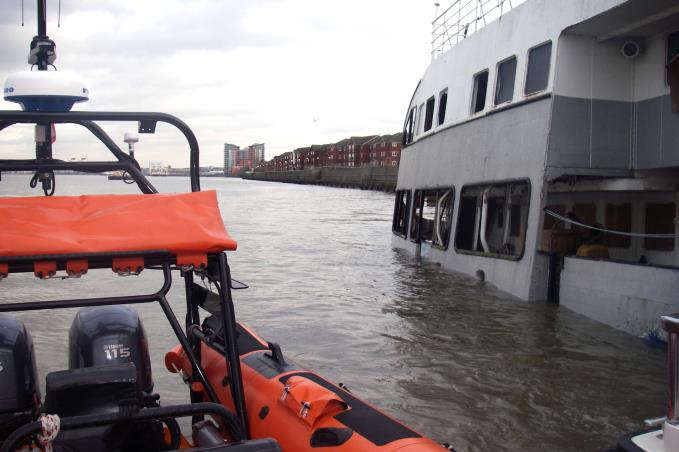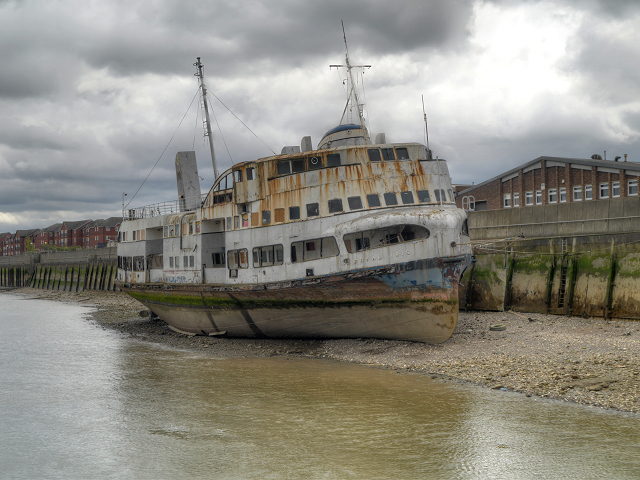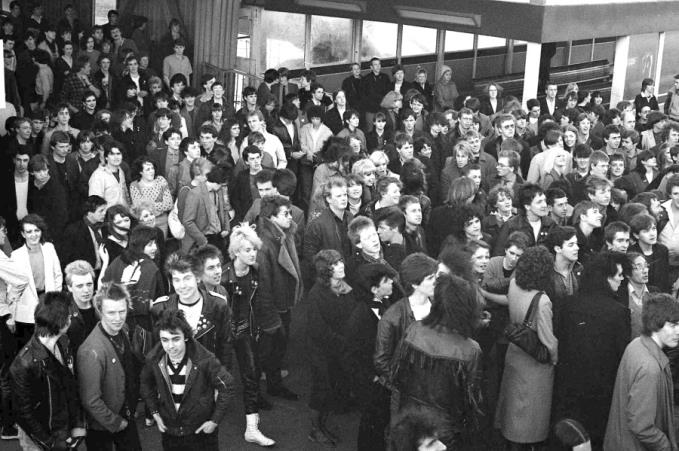LONG GONE and long forgotten. She was the best looking and hardest working girl on the Mersey – and when it came to a party there was no one to touch her.
Now here lies the body of the MV Royal Iris [III], scene of many a disco, concert and student bash. One of the best nights out in the city.
We took her for granted as she sailed up and down the Mersey carrying a whole partygoing generation. People who couldn't have given a flying fig about her proud history, her livery, her fish-and-chip-boat folklore or Gerry (who?) and the Pacemakers.
Here, pictured, William Denny's classic diesel electric ship, completed for Wallasey Ferries in 1950, is sucked into the black mud, captured by the Kent RNLI. An undignified end, but one which, I am very sorry to say, comes as no surprise.
The obituary notes go like this: "The Royal Iris entered service on May 5, 1951, with a passenger certificate of 2,296 for ferry services and 1,000 for cruising. She was refurbished by the Merseyside Passenger Transport Executive in 1972 and, eventually, when needing repairs totalling £4m, was sold out of service in 1993 for use as a night club in Cardiff. Following refusal of planning permission for such a risque use, she was moved to the River Thames, at Woolwich, in 2002. Last week her rotting hull took on water at the appropriately named Gravesend."
 The Royal Iris sinks into the mud on the Thames
The Royal Iris sinks into the mud on the ThamesI confess to a soft spot for the Royal Iris. As a teenager, I found myself, somehow, at the helm of a small arts team working for Merseyside County Council. It was 1985, when the authority was about to be abolished, and we were ordered to organise a real caper: to sail the Iris down to another Pool - the Pool of London - to showcase Liverpool culture, commonly known as “bands and that”.
She was berthed, looking like a children's bath time toy, next to the huge, grey hulk of HMS Belfast, for a week of gigs. Even days after she arrived for her engagement, the proud master, who steered her all the way down the St George's Channel, could barely contain his delight as he recalled the thrill of how Tower Bridge had opened to allow her through, up from Greenwich. Given her petite stature, it was a tip-of-the-hat gesture, I suspect.
The sound check to Saturday's main event, May 11, took place as the horrific spectacle of the Bradford FC fire disaster was playing out live on TV. The port authorities, in an eleventh-hour health and safety panic, first ordered us to call it off, and then relented and made the entire audience of London music bigwigs come across onto the vessel in tugs.
Those who did swallow their pop cool - and who made it aboard, undeterred, to watch rising stars like Ian McNabb's Icicle Works - had never seen anything quite like her. Perhaps they thought it was a permanent rock n roll boat circling the coast of Britain, a ready made music venue, with a proper stage and lights, which took to the seas while the music flowed.
In the last few years, critics and fans alike have asked why wasn't the Iris being brought home, welcomed back like a long lost runaway, and refurbished as a centrepiece of Capital of Culture year.
Cost permitting, would a boatload of drinking revellers have been allowed out in the middle of a dark choppy river in the newly-cautious and highly litigious 21st century?

Perhaps we lament purely the time of the Iris. After all, it was no Eric's or even Cavern in popular folklore. But she was a big part of the fabric of what likes to think of itself as a great maritime city – that means your Cunards, White Stars AND much loved floating venues - and it should never have come to this.
Am I naïve? Is the real reason for her demise simpler? That you can't do everything?
One thing is for sure, the ongoing slow terminal illness of the Royal Iris has been briskly chatted about since 2002, and by those who, arguably, could have made a difference.
And, just like this week, when her fate looked finally and surely sealed, the words, “yes, isn't it sad?” were always used to signal that any further conversation on the matter was over.
Sad is an easy, easy word. Some would go further and say she was sold down the river.
 Punks queue for a gig on the Royal Iris in the late 1970s. Picture: Francesco Melina
Punks queue for a gig on the Royal Iris in the late 1970s. Picture: Francesco Melina












